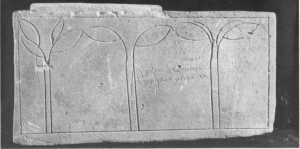“Greet Andronicus and Junia, my relatives [or kinsman] who were in prison with me; they are prominent among the apostles, and they were in Christ before I was.” Romans 16:7 (NRSV)
When I mention the apostle Junia, you may wonder why you have never heard of her before. Once you look up the passage in Romans, what you will discover depends on the translation. Older, more traditional bibles use the name “Junias,” a mistranslation perpetuated from the Middle Ages when religious authorities could not conceive of a female apostle. The early church fathers (some of the first readers of Paul’s letter to the Romans) acknowledged Junia was a woman and praised her for being a gifted apostle. A great deal of scholarship has confirmed that the correct translation is “Junia” for a variety of reasons. Most recent and scholarly bible translations have corrected this error.
From this New Testament passage, we learn several things about Junia:
- She was in prison with Paul
- She was a prominent apostle
- She became a Christian before Paul
- She was either related to Paul or a fellow Jew
- She was involved in the nascent Christian community of Rome long before Paul (or Peter) arrived in the Eternal City
Several scholars mention that Junia is the Greek transliteration of Joanna (Hebrew: Yehohanah), and they suggest she is the woman mentioned in Luke 8:2:
“The twelve were with him, as well as some women who had been cured of evil spirits and infirmities: Mary, called Magdalene…and Joanna, the wife of Herod’s steward Chuza, and Susanna, and many others, who provided for them out of their resources.”
Joanna is also mentioned once again in Luke 24:10 as being a witness to Jesus’ empty tomb.
In my historical novel, Junia: The Forgotten Apostle I follow the suggestion that Junia and Joanna are the same person. Based on this assumption we learn the following about Junia/Joanna:
- She was a noble woman in Herod Antipas court, married to the tetrarch’s right hand man
- She was wealthy enough to help finance Jesus’ mission
- Reading Luke 23:49 – 24:10 in context we learn that she followed Jesus throughout Galilee and witnessed the crucifixion
- After discovering the empty tomb, she, along with several other women, described what they had seen to the twelve apostles. In context with the other gospel accounts of the resurrection, she was one of the women who witnessed the risen Christ.
The other suggestive piece of evidence about Junia/Joanna’s life comes from an ossuary (burial box) which came to light in 1984. Remember Yohahah is the Hebrew transliteration of Anglicized Joanna. The inscription reads:
Yehohanah: Yehohana daughter of Yehohanan, son of Theophilus the high priest

Given all this information, Junia: The Forgotten Apostle follows the trajectory of her life starting from her marriage to a royal courtier, her demonic possession and healing, her itinerant missionary activities with Jesus then her witness of his death and resurrection. Once called as an apostle to spread Jesus’ teachings, she travels with Paul, spends time in prison with him and finds herself a leader in the Roman Christian community. Along the way she faces persecution both from the outside world and within her own community of believers.
She even falls in love…
Related:
Was Junia a Historical Person?
Junia Gets a Sex Change

2 thoughts on “Who Was Junia?”